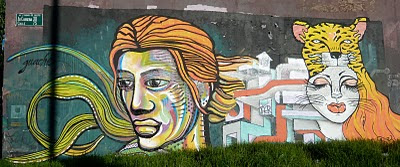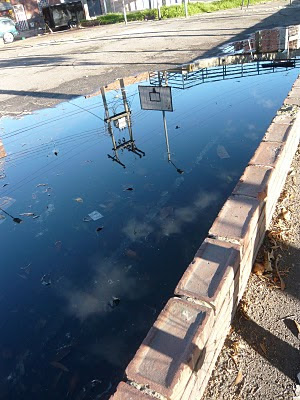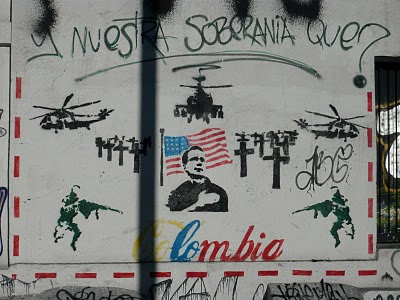Wednesday, March 30, 2011
Wednesday, July 14, 2010
Pastor Murdered Last Night During Church Service in Cali
A pastor was killed last night in the church sanctuary as he was saying goodbye to his parishioners that had attended the service at the International Charismatic Mission Church in the San Bosco neighborhood in downtown Cali.
Around 8:30 p.m. 45-year-old Francisco Valencia, 10 year co-pastor of the evangelical church that meets in the old Alameda Theater, had just finished the service when a short man approached and shot him repeatedly without saying a word.
Church members ran out of the building allowing the shooter to escape. Police later detained the alleged attacker.
"He is a 16-year-old minor. We found a .38 caliber revolver on him," said Colonel Jairo Gutiérrez of the [Cali] Metropolitan Police.
The pastor was taken to the Valle University Hospital where he passed away.
Friday, June 18, 2010
Street Art Bogotá Style
 Most of the following pictures are from a spot along Avenida de Quito (Carrera 30) near calle 70. This picture shows graffiti that was painted over a city-sponsored street-art contest. For a picture of the previous painting click here.
Most of the following pictures are from a spot along Avenida de Quito (Carrera 30) near calle 70. This picture shows graffiti that was painted over a city-sponsored street-art contest. For a picture of the previous painting click here.




 |
The caption here loosely translates: "There are more of us who are ugly!!!" |


 |
| Kate Moss and Coke |



 |
| Yours truly, or a shadow of my former self. |

 |
| Less artistic, but more overtly political: "What about our sovereignty?" |
 |
"Long live liberation theology," on a building at the National University. |
Tuesday, May 18, 2010
WOLA and 80 Colombian Organizations Received Death Threat
May 17, 2010
| | |
WOLA Urgent Action
WASHINGTON OFFICE ON LATIN AMERICA
Promoting Human Rights, Democracy, and Social and Economic Justice in Latin America
May 17, 2010
WOLA and 80 Colombian Organizations Received Death Threat
WOLA urges U.S. Policymakers to Act
On Friday, May 14, the Washington Office on Latin America (WOLA) received a death threat allegedly from the Colombian paramilitary group The Black Eagles directed at over 80 Colombian human rights, Afro-Colombian, Indigenous, internally displaced and labor rights organizations and individuals. The threat states "as so called human rights defenders don't think you can hide behind the offices of the Inspector General or other institutions... we are watching you and you can consider yourselves dead."
The email goes on to falsely accuse the listed organizations of having links to the FARC guerillas and as such declaring themselves military targets. Organizations listed in the death threat are long time partners of WOLA who work on internal displacement, Afro-Colombian and indigenous issues. These include the Consultancy for Human Rights and Displaced (CODHES), the Institute for Development and Peace Studies (INDEPAZ), the National Association for Internally Displaced Afro-Colombians (AFRODES), the League of Displaced Women-Cartagena, the Association of Cabildos of Northern Cauca (ACIN), the Jose Alvear Lawyers Collective (CCAJAR) and various Afro-Colombian community councils in the Pacific region. Several of the groups listed recently visited the U.S. in order to raise awareness of human rights violations linked to violent and illegal land take overs by illegal armed groups. Many of the groups recently met with UN special mechanisms on ethnic minorities, indigenous peoples and extrajudicial executions, U.S. Members of Congress and high level U.S. officials, where they informed such delegations of abuses. Many of these organizations also recently signed a collective U.S.-Colombian civil society letter in support of House Resolution 1224 in favor of honoring Colombia's Constitutional Court for its orders on Afro-Colombian, Indigenous and women internally displaced persons.
While the Colombian Embassy is circulating a bulletin that claims that officials are working to defend the rights of human rights defenders, threats continue to take place. On April 10, U.S. NGOs sent a letter to U.S. Ambassador Brownfield alerting him to another threat against 60 organizations. Also in April, graffiti stating that WOLA partner Justicia y Paz are terrorists and calling for violence against Jesuit priest Father Javier Giraldo were found in different parts of Bogotá. WOLA has also received, in recent months, numerous reports of multiple other threats, sabotage of activities and baseless prosecutions against its partners, as well as killings of mainly Afro-Colombian and Indigenous community leaders, which it constantly reports to both U.S. and Colombia officials. The threat received by WOLA came the day after WOLA staff met with Ambassador Carolina Barco and expressed their deep concern for the safety of its partners in Bogotá, northern Cauca and Buenaventura.
While WOLA appreciates high level officials of the State Department's interest in protecting human rights defenders and Ambassador Brownfield's visits to select human rights organizations in Colombia, we strongly feel that more is needed to send a message to Colombian officials that threats, murders and other forms of sabotage of human rights work is unacceptable. Also it must be made clear to Colombian officials that the rights to protection and assistance of internally displaced persons are guaranteed by Colombia's own laws. Many of the IDP, Afro-Colombian and Indigenous organizations are merely advocating for implementation of Colombia's own laws and commitments to these groups.
WOLA recommends that U.S. policymakers do the following:
-Publicly condemn all forms of intimidation, violence and threats committed against human rights, Afro-Colombian, Indigenous and IDP organizations.
-Refrain from certifying that the human rights conditions for Colombia's military assistance are being met.
-U.S. Members of Congress should co-sponsor and pass House Resolution 1224 that upholds the rights of internally displaced women, Afro-Colombian and Indigenous persons and outlines steps to prevent further displacement from such communities to take place.
For further information please contact:
Gimena Sanchez, Senior Associate, WOLA (202) 489-1702
Thursday, September 24, 2009
Murders and Threats Against Church Leaders in Córdoba, Northern Colombia: Urgent Action Plea!!!

"We could easily be killed for saying this, but the international church needs to know."
Crisis in Córdoba
So far in 2009 six Protestant church leaders from southern Córdoba have been murdered by paramilitary armed groups. Several attempted murders and dozens of death threats have caused the forced displacement of hundreds of people. Some churches have been literally caught in the crossfire. In one town six pastors were threatened to be killed if they failed to make extortion payments. A significant number of the victims were targeted for their community leadership in land-rights struggles and for opposing the violence affecting their communities.
We are profoundly concerned about the ongoing collusion between rearmed paramilitary groups and Colombian public security forces as well as the lack of response from other state agencies to this violence. “We would like to see a change in this marriage between the paramilitaries and the army. If the army were to really fight these groups it would be different,” stated a local pastor. In recent conversations pastors and community leaders spoke of their deep fear about reporting on paramilitary operations that have intensified in the past five months, “If the [state agents and paramilitary groups] knew what we were telling you, as soon as we left this meeting we’d be shot. We don’t dare talk about these things with Colombian authorities. It’s just too dangerous.”
In the province of Córdoba in 2008 there were 512 violent deaths, including six massacres. This is the highest murder rate in the past 18 years. If the violence that has been documented so far in 2009 is an indication, the rate will increase this year.
Since 2006 we have repeatedly denounced the rearming and remobilization of paramilitaries in Córdoba. The territorial dispute between the paramilitary groups has increased this year; the number of cases we have documented as well as the analysis of local leaders indicate that these groups are seeking to consolidate their control. As we have previously documented, the armed groups target local pastors and leaders as a strategy of coercion. According to local leaders and local and regional analysts, the current surge in violence is being driven by an economic interest in drug trafficking routes.
We have documented the following three murders in the past four months of 2009:
1. On September 6 at approximately 10:00 p.m. three hooded presumed paramilitaries came to the home of Foursquare Church Pastor Rafael Velásquez and shot him, killing him immediately. His wife and six young people from the church were present at the time of his murder.
2. On July 24, at approximately 11:20 a.m in the Santa Marta community, the geographic location of paramilitary demobilization talks with the government, four presumed Black Eagles paramilitaries shot and killed Marco Fidel Suárez Moreno. Marco was married to Elcy Ramos with whom he had four children ages 11 to 22. At the time of his murder Marco was a city council member in Montería and a community arbitration provider (Conciliador en Equidad) and a leader at the Galacia (AIEC) Church. Marco was a councilmember in Tierralta from 1998 to 2000 and had previously served as president of the Commmunity Council of Santa Fe de Ralito and Las Aguaditas.
3. On June 28, at 8:00 p.m. four armed men, presumed members of the paramilitary organization, the Self Defense Gaitanistas of Colombia, arrived at Jhon Jairo Martínez’s house in Montería and killed him. Jhon Jairo was a leader from the AIEC church and was married to Olga Isabel Hernández with whom he had three children, ages two to nine. They lived on a farm that had been given to them and 39 other displaced families by INCORA (the Colombian agrarian reform agency) in 1997.
We have documented more than 20 human rights violations in 2009 in the province of Córdoba, including threats, homicides and individual and collective forced displacement by paramilitaries and guerillas. The cases that we have registered corroborate the communities’ claims that the violence is caused by the armed groups’ fight for territorial control and drug-trafficking routes.
Sixteen international non-governmental organizations and denominations sent a letter to the Colombian Attorney General on April 2 of this year reporting paramilitary violence against church and community leaders, listing several specific cases and asking the Attorney General to investigate. Once again, we request a progress report in the investigation of these crimes. We request State agencies and civilian, military and police authorities to take immediate and effective action to ensure justice and to stop these activities that threaten life and human dignity in the province of Córdoba.
The alarming pattern of paramilitary violence is not the full story of Córdoba´s political violence; while they are fewer in number, communities in the department also report persecution from the guerrilla. All aggressions are equally harmful and wrong, no matter by whom they are committed. We condemn them equally.
Prayer:
We ask that you pray for the safety of communities in Córdoba. As Christians we pray for strength and guidance for the members of these communities; that they may persevere in their commitment to working for God’s vision of a nonviolent Colombia that can live in peace with dignity for all. We ask you to also pray for those responsible for this violence that they may turn themselves in, seek restoration of the damage they have done and transform their lives.
Action:
Please send the following model-letter to the Colombian Attorney General and copies to your Members of Congress and to us at janna@justapaz.org
Fiscalía General de la Nación
Guillermo Mendoza Diago
Fiscal General (E)
Diagonal 22 B No.52-01, Fax: (+571)570-2000 Bogotá D.C. Colombia
E-mail: luzhelena.morales@fiscalia.gov.co
Dr. Guillermo Mendoza Diago,
I am writing to express my concern for church and community leaders in the province of Córdoba. So far this year six protestant church leaders and even more social leaders have been killed by presumed rearmed paramilitaries. Among those killed are Pastor Rafael Velásquez, murdered September 6, Pastor Marco Fidel Suárez Moreno, murdered July 24, and church and community leader Jhon Jairo Martínez, murdered June 28.
We ask the Colombian Attorney General’s Office to:
1. Investigate these cases as rapidly and thoroughly as possible.
2. Ensure that those responsible for the crimes be held responsible.
3. Ensure the protection and reparation for the victims of these crimes and their families, as well as that of all persons living in this region who are demanding the rights to their land, in light of the danger and importance of their work.
I ask you to please communicate the status of these investigations to Pablo Moreno, the National Coordinator of the Peace Commission of the Evangelical Council of Colombia (Comisión de Paz del Consejo Evangélico de Colombia – CEDECOL) at 2-513-0781, pablomoreno777@gmail.com and Jenny Neme, Director of Justapaz at 1-287-3968, jennyneme@justapaz.org
Sincerely,
A Prophetic Call: Edition 4

2285 Protestant and Evangelical victims of war in Colombia in 2008. That's 2285 victims of human rights and International Humamanitarian Law violations in Colombia that the Documentation Project of the Protestant Peace Commission (CRVP-CEDECOL) and Justapaz (with which yours truly works) were able to fully document. There are undoubtedly many more, as our human and financial resources and the challenges of doing this type of work in Colombia limit our ability to document all cases.
Download the English report here. Y en español aqui.
Tuesday, July 14, 2009
Naming the Unspeakable, a Witness to Hope
-Thomas Merton, Raids on the Unspeakable
 Idia, William, Narciso, Manuela, Yuby, Rosendo, Fanni, Jorge, Orlina. These are some of the names that have been on my mind a lot over the past year. They are some of the victims of the ongoing war in Colombia; the ones I’ve been privileged to get to know the best. But victim is such an incomplete description of who they are; they name the Unspeakable in Colombia, and through their courage, they are witnesses to Christian hope.
Idia, William, Narciso, Manuela, Yuby, Rosendo, Fanni, Jorge, Orlina. These are some of the names that have been on my mind a lot over the past year. They are some of the victims of the ongoing war in Colombia; the ones I’ve been privileged to get to know the best. But victim is such an incomplete description of who they are; they name the Unspeakable in Colombia, and through their courage, they are witnesses to Christian hope.On September 15th of last year I was told of a community and church leader named Narciso Diaz who had been shot and was in the hospital in Montería a few hours from where I lived. Here is what I wrote to a friend that night:
Today I went to visit with Narciso Diaz and his wife Manuela. Narciso, a church and community leader from a rural part of Tierralta, Córdoba was shot in the face on Thursday night and somehow survived. Around seven p.m. Thursday night Narciso noticed that the door leading from his kitchen to his back yard was open. When he walked outside a man with a hood covering his face stepped forward and pointed a gun at him. He shot Narciso in the face (the bullet traveled diagonally through his mouth and came out of his neck below his ear), and said, "Maybe the Organization of American States will save you," and fled, leaving Narciso for dead.
Narciso’s wife Manuela came running to his aid and found him lying in the living room (where he had made it on his own). She summoned the help that eventually saved his life. Due to the remoteness of where they live as well as Colombia's precarious infrastructure and medical facilities, it was three a.m. before Narciso made it to the hospital. "We know that God was with Narciso. It's a miracle he is alive," Manuela told me today at the hospital.
We believe a paramilitary group that operates in the area targeted Narciso for murder. The reference to the Organization of American States is in reference to leadership workshops that Narciso had taken that were funded and organized by the OAS. The paramilitaries likely thought he was an informant.
Narciso and Manuela are members of Emmaus Church of the Association of Evangelical Churches of the Caribbean. They will now be forced into displacement, as it is too dangerous for them to return home. Needless to say, they are very scared. When I was introduced as a missionary who represented churches in the United States, Narciso said to me, "I am a servant of God. I know there are many people all over praying for me... that is why I am alive. Thank you."
Here is a man, who narrowly escaped death, who has trouble speaking due to the bullet fragment still lodged in his tongue, who has never before met me, but who is grateful for my presence, because he is grateful for your prayers.
Narciso has since recovered his health, and along with Manuela has displaced to a new community. They are now farming new land due to the support structure they found in the Peace Commission of the Evangelical Council of Colombia. Narciso is once again establishing himself as a community leader, helping organize the rural community in their struggle for running water. He and Manuela also lead worship services in their new neighbors’ homes.
In the quote at the top of this letter, Thomas Merton says that the Unspeakable can be broken open to truth only by miracle, by the coming of God. And that living that reality is what it means to be a Christian; for Christian hope begins where every other hope stands frozen stiff before the face of the Unspeakable.
Narciso is now eager to share his story. Having stared death in the face and having been sustained by faith he embodies the miracle that can break open the Unspeakable. He hopes that his story and his courage can help turn the tide of violence in Colombia.
And as for me, I’m doing well... continually grateful for the opportunity to accompany folks like Narciso and Manuela and be a witness to their Christian hope.
Grateful for your sustaining prayers,
Michael